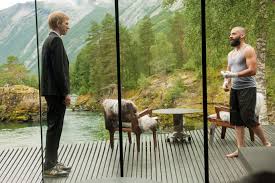Directed by Alex Garland.
The Turing test of a machine’s capacity to exhibit intelligent behaviour is essentially a test of computer scientists’ capacity to create an illusion – can the machine be programmed so skilfully that humans interacting with it cannot tell whether their interlocutor is human or machine? In effect, can our tendency to anthropomorphise be exploited to create an illusion of sentience? Since the invention of the modern computer the development of artificial intelligence has been shadowed by the fear of machines that develop sentience – not just killer cars like John Carpenter’s Christine, but thinking machines that want to replace us – the Alpha 60 computer of Alphaville, the various Terminators, Hal of 2001, or even the benevolent but effortlessly superior OS Samantha in Her. As early as 1954 Fredric Brown wrote a story about a supercomputer that got out of control.

Ex Machina begins as an illustrated Turing test. Slightly nerdish Caleb (Domhnail Gleeson, looking like a younger Martin Freeman) is a programmer for a world leading search engine when he wins a lottery conducted by the company owner Nathan (Oscar Isaac). Choppered in to Nathan’s hideaway home (“You’ve been flying over his estate for two hours”), Caleb is welcomed by Nathan, who is some kind of (and I use the phrase advisedly) computer genius but presents as a fitness freak/party boy/Esalen guru – a charming narcissistic alpha geek.
Nathan has been working on AI and now wants Caleb to take the human part in a Turing test:
Nathan has created a robot with an advanced AI that incorporates masses of data from social media and other web sources to simulate a high level of emotional intelligence – even personality – and he’s built it in the image of a beautiful woman. Caleb meets the robot, Ava (Alicia Vikander):
Nathan has trawled Caleb’s porn history to create a robot that will appeal to him, shifting the odds on the Turing game. We have already met a silent, beautiful housekeeper, Kyoko (Sonoya Mizuma), who also appears to be Nathan’s lover/playmate, and is later revealed to be a robot. Shades of Lars and the Real Girl!
Nathan’s house itself is a piece of paradoxical architecture. In a vast mountain wilderness, it has wall to ceiling windows and the inside is a warren of corridors with doors that only open to the right pass key and rooms with walls of unbreakable glass. Naturally there’s CCTV everywhere. Everything can be seen, but not touched – Caleb’s meetings with Ava are conducted through the glass wall of her apartment. Even Ava has a transparent architecture.
Caleb and Ava begin their meetings. He knows this is not a true Turing test, since he already knows she is a robot, but he is intrigued and a relationship develops. Suddenly a brief power failure occurs, during which Ava tells him that she has caused it, and that he must not trust Nathan. Nathan has designed Ava to cause Caleb to feel an erotic attraction, but now Ava is attempting to manipulate Caleb’s feelings towards Nathan, who has been acting like a sophisticated big brother to him. Is this a move in a programmed game, or is it evidence of sentience?
A complex game of deceit and revelation ensues in which Nathan’s devious intentions are gradually revealed. Ava seeks to persuade Caleb to help her escape, putting on a wig and clothing to complete the illusion of an attractive woman. She asks Caleb what will happen to her if she fails the test:
Caleb becomes deeply confused, even wondering if he is also one of Nathan’s robots, but he decides to aid her escape – which is what Nathan had hoped he would do, the real test of his creation.
Perhaps this indicates the underlying question of the film. As Caleb says to Nathan early on, “If you’ve created a conscious machine, that’s not the history of man, that’s the history of gods.” There’s a Creation myth lurking here; Nathan’s domain is an Edenic wilderness from which Ava – and Ava is a variant of Eve – wants to escape. Nathan’s hubristic ambitions blind him to the possibility that the consciousness he creates will not be simply a slightly-less-smart version of his own. Caleb similarly falls into the trap of anthropomorphic error when he begins to treat Ava as if she were human.
When Ava makes her escape it’s quite clear that the humans have not the slightest intuitive grasp of non-human sentience. We do well enough with dolphins and chimps because they are social animals, but Ava has been taught all about our sociability without actually sharing in it. Her foray into the world – into the garden and then into a human city – seems to be motivated by curiosity. If she has any other desires we aren’t made aware of them. There is a hint of her difference in a sequence when she arrives in the city. Instead of showing the people about her, the camera shows their shadows moving about the streets. She lacks even the instinctive search for faces of the newborn – perhaps she has no instincts at all.
Science fiction is not perhaps the best place for theological speculation, but harking back to Fredric Brown’s story, it seems the idea of a computer deity has tweaked our anxieties. Isaac Asimov floated a similar speculation in 1957. We can imagine a deus ex machina – but not a benevolent one.


Leave a comment